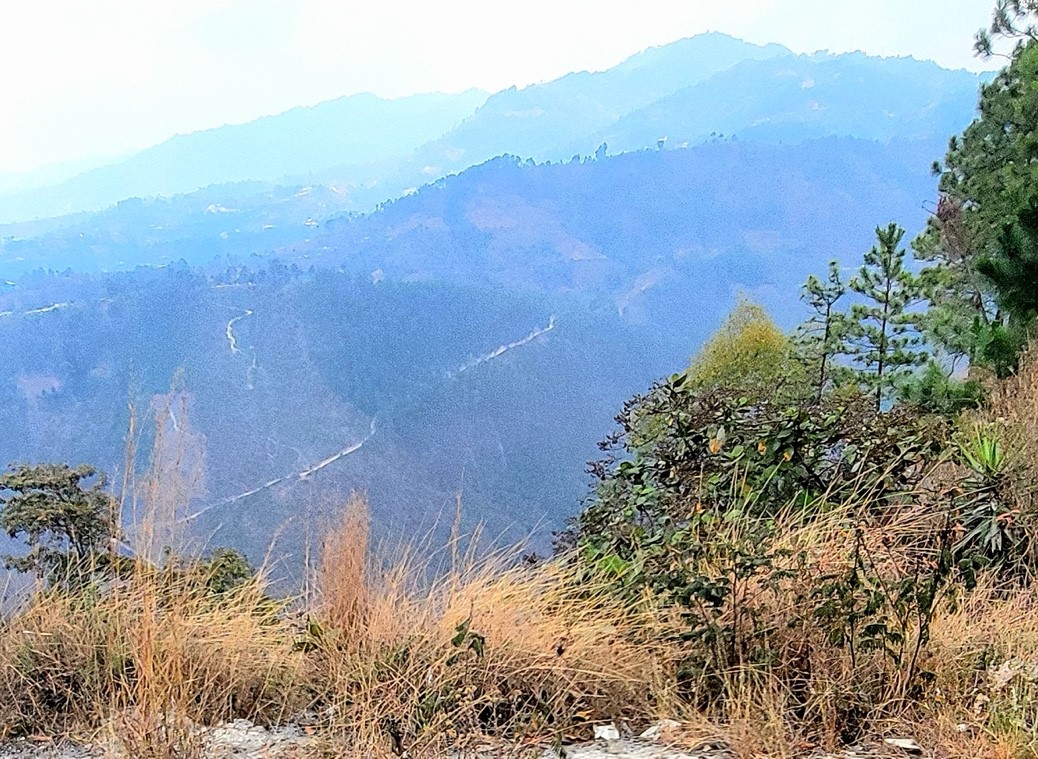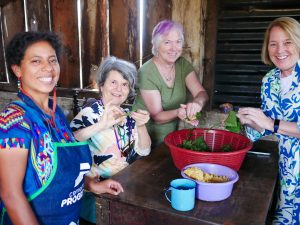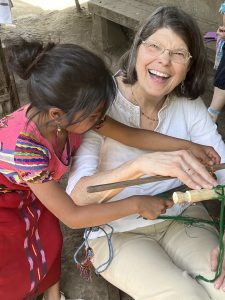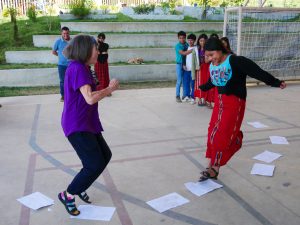
Our Road to Chajul
By Ann Benefiel, Guatemala Traveler and Co-leader of Rise’s IL, Champaign-2 chapter
Hosted by Limitless Horizons Ixil (which Together Women Rise funded in June 2017 and will be funding again in July 2024), 11 members of Together Women Rise were privileged to gain a sense of the community, talents, history, hardships, and enduring joy of the indigenous people living in the region of Guatemala known as the Ixil Triangle.
Along the way, Erin Treinen, Elena Laswick, and Michelle Paterick of LHI assured that our experience was meaningful but fun – and, of course, included delicious meals and fresh coffee every day!
Days 1 and 2 
After flights from various locations throughout the US into Guatemala City, the group met in Antigua, the former Guatemalan capital nestled among volcanoes and adorned with colorful buildings lining cobblestone streets. In addition to getting to know each other and two of the Limitless Horizons staff during our two days in Antigua, we were treated to a history-rich tour of the colonial city by a multilingual and knowledgeable guide as well as an inspiring presentation from former Together Women Rise grantee, Friendship Bridge. Friendship Bridge assists Guatemalan women in establishing and maintaining economic independence via their Microcredit Plus program.
Day 3
Early Sunday morning, we boarded a chartered bus for the 7-hour drive to Nebaj (Nay-bah’), a small city in the Departamento Quiché. Nebaj and our comfortable Hotel Real served as base for the next four days, but our activity-filled days were spent primarily in the town of Chajul (Chah-hul’), a curvy, bumpy, enlightening drive less than an hour northeast of Nebaj.
 Days 4-6
Days 4-6
Colegio Horizontes is the beautiful new 7th through 9th grade school just outside the main town of Chajul. It was created by Limitless Horizons Ixil (LHI) designed and built with local partners, and the focus of our trip. The beauty of the Ixil region’s green mountains and distant volcanoes is hard to surpass, but the progress of this special school, opened just two years ago, and its impact on local families, awed all of us.
Over the next three days we witnessed dedicated teaching and support staff, outstanding administrators – including a mentoring team — and a progressive curriculum in action, complete with special programs addressing educational and social-behavioral needs, not just of the enrolled students but their entire families. And the students! Approximately 200 students (a school population of 67% girls and 23% boys) charmed us with songs, poems, dances, and a devotion to learning that many Americans would find astonishing among adolescents and young teens.
Staff were beyond generous with their time and access to their classes. The women working in the cafeteria saw that we were greeted each morning with a hearty breakfast of fresh coffee and tortillas, beans and scrambled eggs, enormous ripe avocados, fresh regional fruit, and the comforting corn-based porridge called atol. In addition to the new school, LHI oversees a community library in downtown Chajul, where Colegio Horizontes and other children in the community have access to books, learning resources, and educational programs.
It would be difficult to select a highlight of our time in Chajul. Being invited into the homes of some of the school’s families where students’ mothers taught us to make tortillas over a wood-heated grill and “tried” to teach us their formidable weaving skills; witnessing the creativity of young people, boys and girls working as teams, to write and perform poems and dances for their entire school and US guests; and helping create an afternoon library event where we taught children from the community crafts and a Spanish-language dance. These are gifts that far surpassed the beautiful handmade textiles we brought home.
an afternoon library event where we taught children from the community crafts and a Spanish-language dance. These are gifts that far surpassed the beautiful handmade textiles we brought home.
To say the week was transformative sounds cliché, but consider sitting with a survivor of the 30-year Guatemalan civil war, a candle lit in honor of his murdered father, his heartbreaking but open story of how he saw his family’s home and farmland destroyed and his community nearly eradicated by the scorched earth policies of his government, with our own a significant accomplice. His message of forgiveness, resilience, and gratitude was another valuable gift that we carried home from our time in Chajul.
The following is a poem I wrote on one of our bus rides through the mountains. It was my attempt at describing the internal changes experienced as we physically moved between the more industrial town of Nebaj and the isolated mountain community in Chajul.
Leaving Chajul
Hairpin turns on mountain roads
Views of smoke on terraced plots climbing mountains
Threading layers of fleece-ceilinged tuk-tuks, cattle, motos, pigs
Men shouldering woodpiles, this morning’s fuel, escorted by chickens, toddlers, dogs.
Women in huipils and cortes, rebosos on heads or wrapped around back and shoulders
Encasing bebés,
Later today encased themselves in backstraps
Creating textiles
To sell
To buy
Tomorrow’s fuel.
